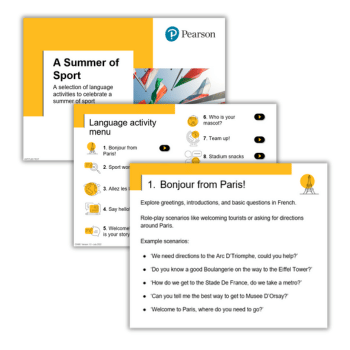Spanish games – Educational SPaG ideas to try in class

SPaG needn’t be a drag in Spanish MFL, if you use Sam Pope’s suggestions for games that can inject some energy, fun and effective learning into your lessons…

- by Sam Pope

Use these Spanish games as a class activity or as warm-up exercises to get your class thinking and speaking. Because they’re so fun, your students won’t think of it as learning…
Spanish game 1: Simón dice (Simon Says)
Learning objective: Using the imperative to command others to move.
This lively Spanish game is a perfect warm-up for any lesson, and useful for learning and consolidating the imperative tense – either in the ‘vosotros’ form if doing this as a whole class, or the ‘tú’ form when having students play the game in pairs.
What you need: Just your voices and enough space to move around in!
How to play this game
- Tell the class you are going to play Simón dice. You – or a student, if you prefer – will command the class to perform an action, and everyone must duly do as they’re told.
- Ask the class if they can remember how to use the ‘vosotros’ and/or ‘tú’ form of the imperative. (For vosotros, replace the ‘r’ at the end of the infinitive with a ‘d’ – e.g. saltar = ¡saltad!)
- Ask for examples of verbs that indicate different actions and write them on the board. If they don’t know the Spanish for some of them, write down the English and then translate into Spanish.
- Encourage students to be more elaborate and inventive with their commands. With ‘nadad en el mar’, for example, students can swim with their arms as though they’re in a rough sea. For ‘comed un bocadillo’, they could mime eating a massive sandwich.
Alternatives and variants: Have the students form pairs and ask them to practise issuing and obeying orders. (You might need to remind them of how to conjugate the tú form of the imperative – take off the ‘s’ in the ‘tú’ form of the present tense, e.g. corres = ¡corre!)
You could also try asking for volunteers to come to the front and show their classmates what they did.
Spanish game 2: ¡Encuentro cuatro! (Connect Four)
Learning objective: To connect four (or more) words from topic groups or grammar points.
This is a version of the popular game Connect Four, which you can use for whatever topic you want to teach or revise. It’s brilliant for consolidating grammar rules and revising vocabulary.
What you need:
- A ‘Connect Four’ template – free versions are readily available online.
- Enough template copies for one to be shared between two players
- Two differently coloured pens per pair
How to play this Spanish game
- Decide which topic you want to base the activity on (for the sake of this example, let’s go with ‘present-tense regular verbs’).
- Write or stick the infinitive of a regular verb in each square or circle, alongside the form you want students to answer in – e.g. comer (nosotros), hablar (ella), vivir (yo).
- Have students form pairs and distribute one template copy to each pair.
- Tell students to each choose one of the coloured pens. They will then use this to colour in the spaces on the board when they give a correct answer: e.g. comer (yo) – comemos, hablar (ella) – habla, vivir (yo) – vivo.
- Students compete to see who can be first to get four in a row – horizontally, vertically or diagonally.
- When everyone’s finished, check with the class to ensure they’ve given the correct answers (and spellings!).
Alternatives and variants: You could turn this into a whole-class activity by splitting the students into two larger groups and displaying the game on the interactive whiteboard.
The groups are given time to confer, before nominating one or more spokespersons to answer in turn.
Sam Pope is a KS1 to KS4 tutor of Spanish and English literature, working with primary and secondary students, as well as a novelist and writer of short fiction.
Browse GCSE maths games, history games and KS3 English games.










